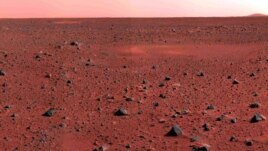15 August, 2024
The idea of turning Mars into a livable world for humans is a common element of science fiction. But could such an action be done in real life?
Scientists are now proposing a new method to warm up Earth's planetary neighbor. The idea involves putting engineered particles made of iron or aluminum into the atmosphere. The goal is to trap escaping heat and direct sunlight toward the Martian surface.
The proposed idea would be to increase the natural greenhouse effect on Mars and raise its surface temperature by around 28 degrees Celsius over ten years.

FILE - This image taken by the Mars Exploration Rover Spirit's camera shows the Martian surface southwest of the rover's landing site. (REUTERS/NASA/JPL/Arizona State University/Cornell University/Handout)
Such a change alone would not make Mars livable for people. But the scientists who developed the idea see it as a possible first step.
Edwin Kite of the University of Chicago helped lead the study that appeared recently in the publication Science Advances.
Kite described the process of terraforming – meaning to change a planet's environment to be more like Earth. "For Mars, warming the planet is a necessary, but insufficient, first step. Previous concepts have focused on releasing greenhouse gases, but these require large amounts of resources that are scarce on Mars," he said.
Kite added that climate modeling suggests the new idea of using engineered particles to warm Mars' atmosphere could work better than previous ideas. Kite explained that the work is important because it presents a possible method that could help future exploration plans.
NASA has sent robotic vehicles to explore the Martian surface and the InSight Lander to study the planet's interior. The U.S. space agency's Artemis program aims to put astronauts in the coming years on the moon's surface for the first time since 1972 in preparation for possible future human missions to Mars.
There are several barriers to human settlements on Mars. They include a lack of breathable oxygen, harmful ultraviolet radiation, salty soil, and dust storms that sometimes cover much of the planet. And Mars' cold temperatures are a serious issue.
The median Martian surface temperature is about minus-65 degrees Celsius. With its thin atmosphere, solar heat on the Martian surface easily escapes into space. The proposal would aim to permit liquid water to exist on the surface of Mars, which has water in the form of ice at its polar areas and its subsurface.
The scientists proposed continuously releasing tiny particles, called nanorods, into the atmosphere at a rate of about 30 liters per second for years.
Samaneh Ansari of Northwestern University in Illinois is the study's lead writer. Ansari said, "The idea is to either ship the material or better yet, ship the manufacturing tool and make the nanorods on the planet since iron and aluminum are abundant on the surface of Mars.”
The researchers are mindful of the possibility of unintended consequences in terraforming another world. Scientists, for instance, are eager to learn whether Mars has held life in the past - or perhaps currently, in the form of subsurface microbes.
Kite suggested that the costs and benefits of releasing nanorods are uncertain. For example, he said if Mars' soil has compounds that are harmful to life from Earth, then the benefit of warming Mars is zero.
I'm John Russell.
Will Dunham reported on this story for Reuters. John Russell adapted it for VOA Learning English.
_______________________________________________
Words in This Story
fiction – n. an invented story
greenhouse effect – n. warming of the surface and lower atmosphere of a planet that is caused by conversion of solar radiation into heat
insufficient – adj. not enough, inadequate
concept – n. an abstract or generic idea
focus – v. to concentrate attention or effort
median -- n. the middle value of a range of values
polar – adj. of or relating to a geographic pole
abundant -- adj. existing or occurring in large amounts
consequence -- n. something produced by a cause